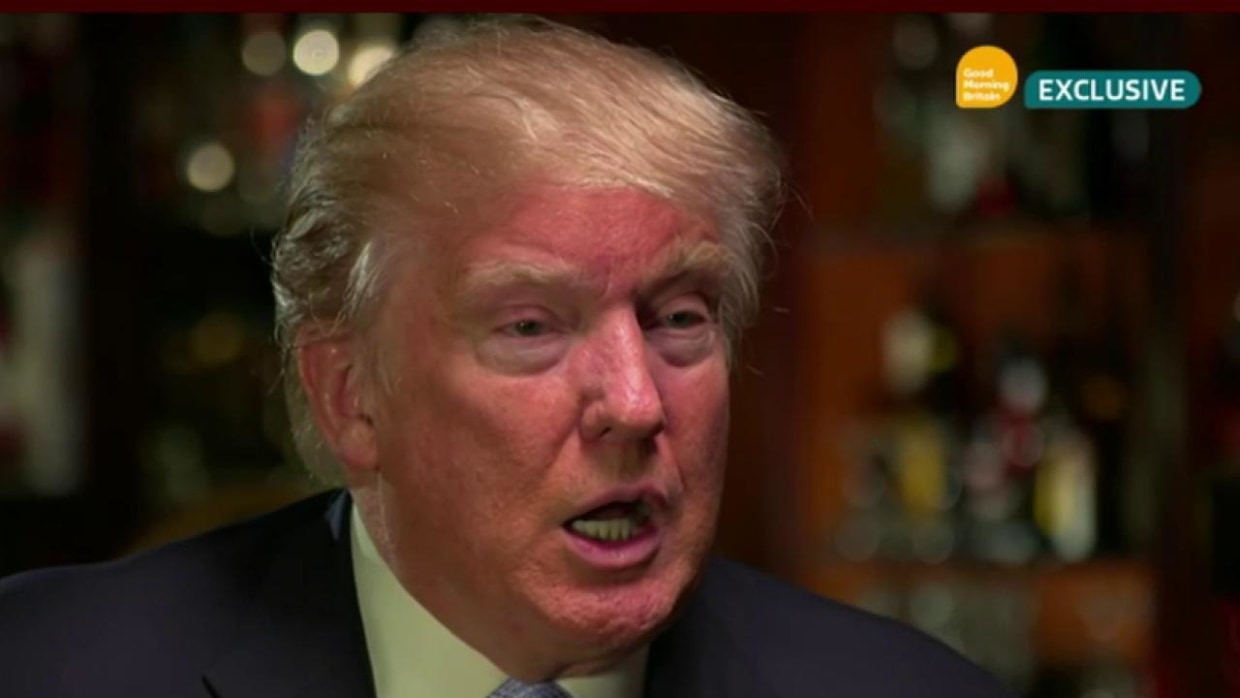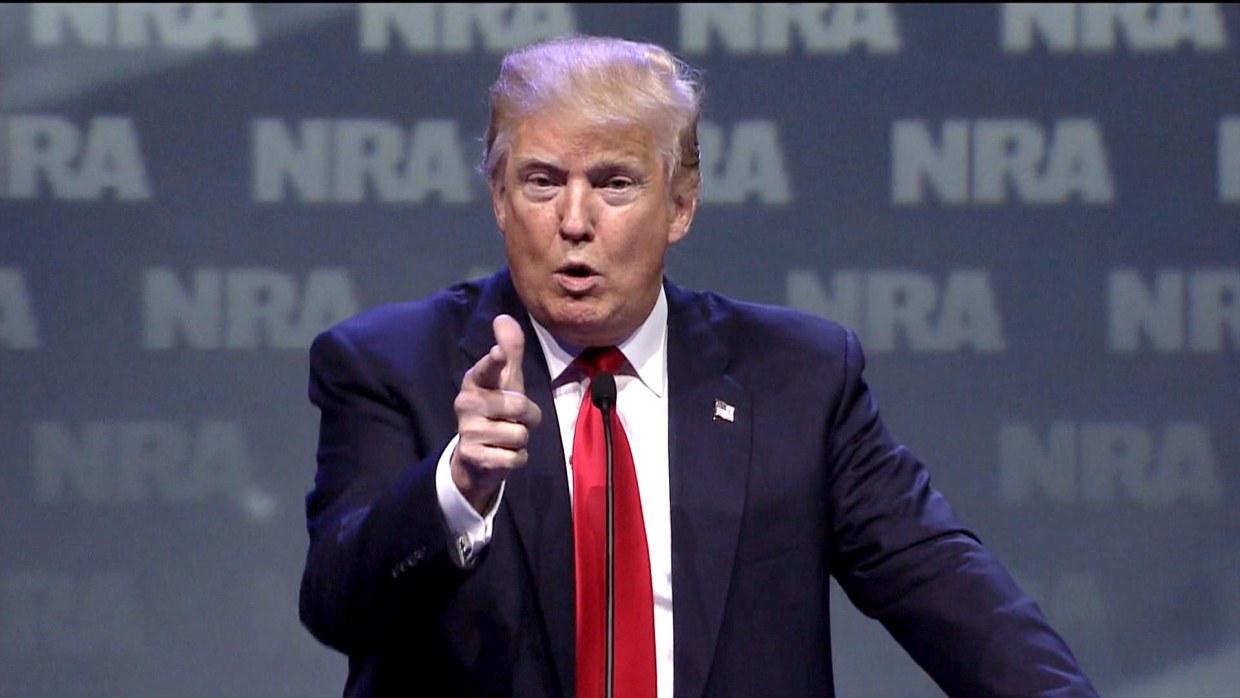Presidentship is the quickest way to get rich for some, but not for all.
Trump's Message on Super PACS Takes General Election Turn
NEW YORK — Donald Trump has devoted much of his campaign to railing against a corrupt system where politicians must answer to their donors — and to promising his supporters that he will break that mold.
But on the issue of outside money and funding in the general election, what Trump says and what his campaign does isn't quite matching up. As more super PACs continue to emerge in support of his general election bid, both campaign and candidate have offered conflicting viewpoints.
The candidate won't definitively rule out super PAC funding, instead suggesting that he doesn't want it for himself, but for the Republican Party.
"I do love self-funding," he told MSNBC's Morning Joe in May, one day after winning the Indiana primary. "I mean, do I want to sell a couple of buildings and self-fund? I don't know that I want to do that necessarily, but I really won't be asking for money for myself, I'll be asking money for the party."
Trump campaign manager Corey Lewandowski, on the other hand, is still ruling out the big-money groups entirely. "We don't have Super PACs," he told NBC News.
But when pressed about the two specific groups vying for the Trump stamp of approval, Committee for American Sovereignty and Great American PAC, Lewandowski wouldn't comment.
That silence is a change from the campaign's previous efforts to actively shut down super PACs attempting to support the campaign. In the month of April alone the campaign filed three complaints to the FEC disavowing a trio of unofficial super PACs backing Trump.
But even with the Trump campaign staying silent on the latest outside money groups backing the candidate, it's unclear whether either one has the legitimacy to be effective.
Major donors and fundraisers tell NBC News they're unlikely to contribute to the groups, with one operative calling them "a running joke" among the GOP's donor class. And the competition between the two runs the risk of splitting the available donor pool and leaving each group ill-prepared to respond to the expected onslaught of millions in attacks from a handful of well-established Democratic super PACs.
Pushing forward
Despite those challenges, however, both groups are pushing forward with their plans.
Doug Watts, Executive Director of the Committee For American Sovereignty and a former spokesman for Ben Carson's campaign, acknowledged to NBC News that the late start puts them at a disadvantage — but argued the group will still be able to rake in millions.
"In the end, does it mean you won't have raised as much money as if you had started a year earlier? Probably," Watts said.
"This isn't going to be easy — but it isn't going to be that hard," he added, pointing to a "boiling" landscape from donors who have largely been "sitting on their hands" this election.
That, he says, means "pent up demand." And Watts predicts more action from pro-Clinton super PACs, like Priorities USA, will act as "an incentive to get going" for donors who are still on the sidelines.
The group, he said, is on track to raise $20 million before the convention, with "a couple million" already banked and an overall goal of $100 million for the cycle.
And Watts insists competing with Great America PAC for donor dollars isn't a concern: "I don't look at it as a competitive environment," he said.
But the co-chair of that rival group, Great America PAC, does see a problem.
"Multiple organizations confuse donors and build in inefficiencies," Eric Beach, Great America PAC's co-chair, told NBC News.
His group plans to raise and spend more than $100 million by Election Day, putting the group on a clear collision course with Watts'. And in a conference call with donors on Wednesday, Great America PAC co-chair Ed Rollins (joined on the call by former Cruz-backer turned Trump endorser, Rick Perry), said that they "are playing catch up to match those resources" already amassed by pro-Clinton super PACs.
But they already have a clear advantage over CFAS — Great America PAC launched earlier, has already spent seven figures supporting Trump's bid, Beach said, and is planning a gathering for major GOP donors at oil magnate T. Boone Pickens' ranch early next month.
Common goals
The battle over funding aside, however, the groups have near-identical goals: To help Trump win in a handful of key battleground states to ensure he takes the 270 Electoral College votes needed to nab the White House.
Rollins said in the conference call Great America PAC will target seven or eight battleground states, including Ohio, Florida and Pennsylvania. "We win those states," he said.
Watts said CFAS is "holding their fire for now" but will look to set up strategic voter registration and get-out-the-vote programs as they see polling in to-be-determined battleground states develop.
"We haven't done any survey research," Watts said, adding they probably won't until after the convention. Attempting to counter arguments that could be far too late to be effective, Watts points to "the dips and bumps in this campaign."
"People need to get more focused," Watts insists, "and the conventions serve that purpose and 'reset' the general election."
But for all their talk of raising millions, the two groups have little to show for their efforts so far. FEC filings show Great America PAC raised just over half a million in the first four months of the year, but much of that money was small-dollar donations that contributors intended to go to the Trump campaign. They spent about $1.2 million in that same time period and as of the end of March had negative cash on hand.
Committee for American Sovereignty has yet to file a report with the FEC.
And major donors remain skeptical of the groups.
"The Super PACs that have been set up so far for Trump are, have been sort of a running joke because the people involved in them were the people that scammed Ben Carson, or Ed Rollins, who hasn't been involved in a major campaign since the 90s," said one GOP operative involved in the top levels of Mitt Romney's and Jeb Bush's campaign.
Another donor suggested that Trump's talk of self-funding and dismissal of outside money on the stump had hurt the chances of any outside effort.
"Trump says he's worth billions — why would I contribute my money to help him get elected if he's worth enough to do it himself?" the donor said.
It's yet another case in which Trump's words in the primary are coming back to haunt him in the general.
The pivot toward a tacit acceptance of the big-money groups remains in direct contrast with Trump's prior promises to continue to self-fund.
The day after his last rival, John Kasich, dropped out of the race, Trump broke that promise: "I'll be putting up money, but won't be completely self-funding," he told the Wall Street Journal.
A senior campaign source said that clarity will come over the course of the next week on a "number of subjects," including PACs. The source, granted anonymity to speak more freely on the topic, said Trump's silence on super PACs was intentional because he didn't want to further confuse his message.
But the source insisted Trump hadn't strayed from his roots as an anti-big-money political outsider.
"He's the same person today as when he announced," the source said, but added: "He's the nominee."
"There's responsibility that comes with that role. He still would like to self fund everything but he cant fund the party."
Still, the source insisted: "He's not changing his vision or his outsider image."

